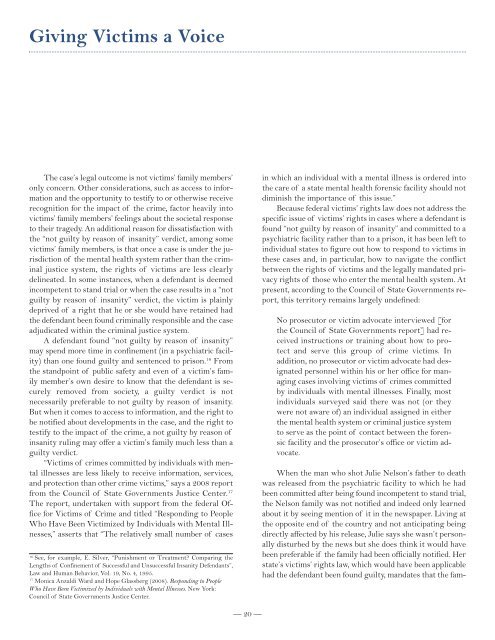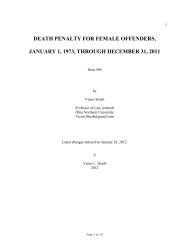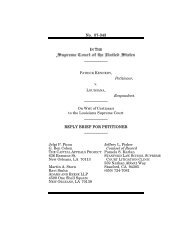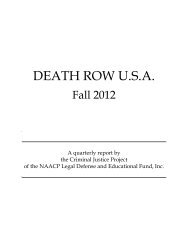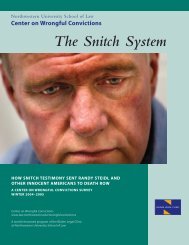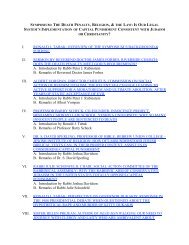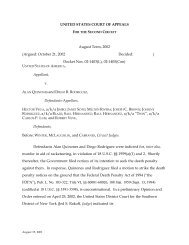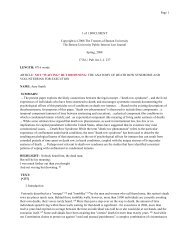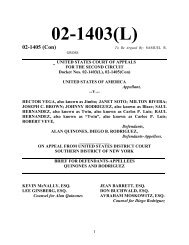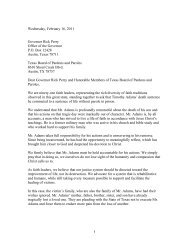Double Tragedies - Families for Human Rights
Double Tragedies - Families for Human Rights
Double Tragedies - Families for Human Rights
- No tags were found...
You also want an ePaper? Increase the reach of your titles
YUMPU automatically turns print PDFs into web optimized ePapers that Google loves.
Giving Victims a VoiceThe case’s legal outcome is not victims’ family members’only concern. Other considerations, such as access to in<strong>for</strong>mationand the opportunity to testify to or otherwise receiverecognition <strong>for</strong> the impact of the crime, factor heavily intovictims’ family members’ feelings about the societal responseto their tragedy. An additional reason <strong>for</strong> dissatisfaction withthe “not guilty by reason of insanity” verdict, among somevictims’ family members, is that once a case is under the jurisdictionof the mental health system rather than the criminaljustice system, the rights of victims are less clearlydelineated. In some instances, when a defendant is deemedincompetent to stand trial or when the case results in a “notguilty by reason of insanity” verdict, the victim is plainlydeprived of a right that he or she would have retained hadthe defendant been found criminally responsible and the caseadjudicated within the criminal justice system.A defendant found “not guilty by reason of insanity”may spend more time in confinement (in a psychiatric facility)than one found guilty and sentenced to prison. 16 Fromthe standpoint of public safety and even of a victim’s familymember’s own desire to know that the defendant is securelyremoved from society, a guilty verdict is notnecessarily preferable to not guilty by reason of insanity.But when it comes to access to in<strong>for</strong>mation, and the right tobe notified about developments in the case, and the right totestify to the impact of the crime, a not guilty by reason ofinsanity ruling may offer a victim’s family much less than aguilty verdict.“Victims of crimes committed by individuals with mentalillnesses are less likely to receive in<strong>for</strong>mation, services,and protection than other crime victims,” says a 2008 reportfrom the Council of State Governments Justice Center. 17The report, undertaken with support from the federal Office<strong>for</strong> Victims of Crime and titled “Responding to PeopleWho Have Been Victimized by Individuals with Mental Illnesses,”asserts that “The relatively small number of cases16See, <strong>for</strong> example, E. Silver, “Punishment or Treatment? Comparing theLengths of Confinement of Successful and Unsuccessful Insanity Defendants”,Law and <strong>Human</strong> Behavior, Vol. 19, No. 4, 1995.17Monica Anzaldi Ward and Hope Glassberg (2008). Responding to PeopleWho Have Been Victimized by Individuals with Mental Illnesses. New York:Council of State Governments Justice Center.in which an individual with a mental illness is ordered intothe care of a state mental health <strong>for</strong>ensic facility should notdiminish the importance of this issue.”Because federal victims’ rights law does not address thespecific issue of victims’ rights in cases where a defendant isfound “not guilty by reason of insanity” and committed to apsychiatric facility rather than to a prison, it has been left toindividual states to figure out how to respond to victims inthese cases and, in particular, how to navigate the conflictbetween the rights of victims and the legally mandated privacyrights of those who enter the mental health system. Atpresent, according to the Council of State Governments report,this territory remains largely undefined:No prosecutor or victim advocate interviewed [<strong>for</strong>the Council of State Governments report] had receivedinstructions or training about how to protectand serve this group of crime victims. Inaddition, no prosecutor or victim advocate had designatedpersonnel within his or her office <strong>for</strong> managingcases involving victims of crimes committedby individuals with mental illnesses. Finally, mostindividuals surveyed said there was not (or theywere not aware of) an individual assigned in eitherthe mental health system or criminal justice systemto serve as the point of contact between the <strong>for</strong>ensicfacility and the prosecutor’s office or victim advocate.When the man who shot Julie Nelson’s father to deathwas released from the psychiatric facility to which he hadbeen committed after being found incompetent to stand trial,the Nelson family was not notified and indeed only learnedabout it by seeing mention of it in the newspaper. Living atthe opposite end of the country and not anticipating beingdirectly affected by his release, Julie says she wasn’t personallydisturbed by the news but she does think it would havebeen preferable if the family had been officially notified. Herstate’s victims’ rights law, which would have been applicablehad the defendant been found guilty, mandates that the fam-__ 20 __


